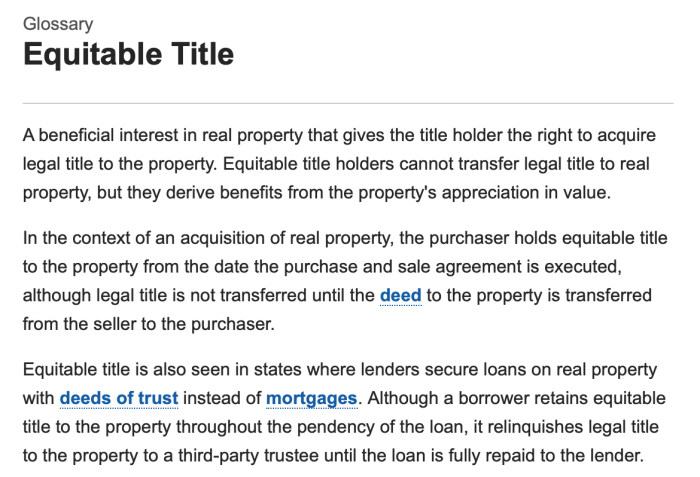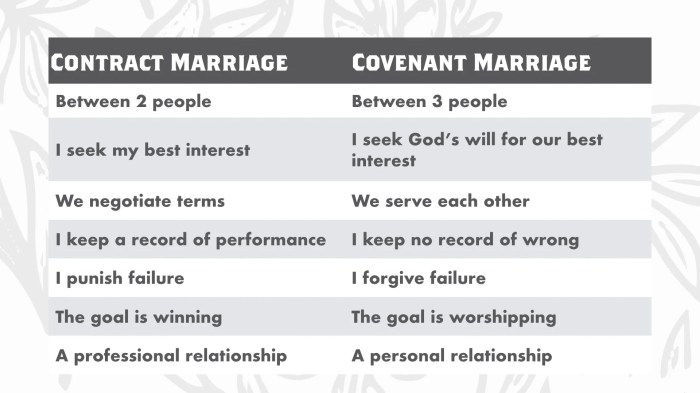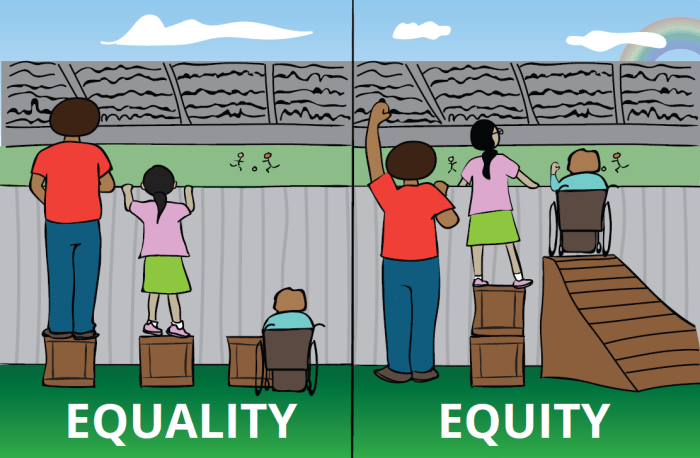Equitable servitude vs real covenant – In the realm of real estate law, the concepts of equitable servitude and real covenant play a pivotal role in shaping land use and development. Understanding the nuances between these two types of restrictions is crucial for practitioners and property owners alike.
This article delves into the definitions, creation, enforcement, benefits, drawbacks, and legal implications of equitable servitudes and real covenants, providing a comprehensive overview of their significance in real estate transactions.
Definition and Nature

Equitable servitudes and real covenants are both legal agreements that create restrictions on the use of land. However, there are some key differences between the two.
An equitable servitude is a restriction that is imposed on the land itself, regardless of who owns it. It is created by a written agreement between the landowner and a third party, and it is enforceable against all subsequent owners of the land.
A real covenant, on the other hand, is a restriction that is imposed on the owner of the land, rather than on the land itself. It is created by a deed, and it is only enforceable against the original owner of the land and their successors in title.
Examples
Some common examples of equitable servitudes include restrictions on the use of land for residential purposes only, restrictions on the height of buildings, and restrictions on the number of animals that can be kept on the property.
Some common examples of real covenants include agreements to maintain a certain level of landscaping, agreements to pay homeowners association fees, and agreements to not sell the property to certain types of buyers.
Creation and Enforcement

Equitable servitudes and real covenants are created through different methods and subject to distinct legal requirements. Enforcement mechanisms also vary depending on the type of restriction.
Creation
Equitable Servitudes
Equitable servitudes are typically created through an agreement between the grantor and grantee. This agreement can be written or oral, but it must be clear and unambiguous regarding the restrictions being imposed. The grantor must have an equitable interest in the land, and the grantee must have notice of the restriction.
Real Covenants
Real covenants are created through a deed that runs with the land. The deed must be executed by the grantor and grantee, and it must contain language that creates a covenant running with the land. The covenant must touch and concern the land, and it must be intended to benefit or burden the land.
Enforcement
Equitable Servitudes
Equitable servitudes are enforced through equitable remedies, such as injunctions and specific performance. An injunction can be used to prevent a violation of the servitude, while specific performance can be used to compel compliance with the servitude.
Real Covenants
Real covenants are enforced through actions at law, such as damages and specific performance. Damages can be awarded for breach of the covenant, while specific performance can be used to compel compliance with the covenant.
Benefits and Drawbacks

Equitable servitudes and real covenants are both legal mechanisms used to restrict the use of land. However, there are some key differences between the two types of restrictions that can affect their benefits and drawbacks.
Advantages of Equitable Servitudes
- Equitable servitudes are easier to create than real covenants.
- Equitable servitudes can be enforced against anyone who has notice of the restriction, even if they are not the original party to the agreement.
- Equitable servitudes can be used to restrict a wider range of activities than real covenants.
Disadvantages of Equitable Servitudes
- Equitable servitudes are not as well-defined as real covenants, which can make them more difficult to enforce.
- Equitable servitudes can be extinguished more easily than real covenants.
- Equitable servitudes are not always binding on third parties, such as purchasers who do not have notice of the restriction.
Advantages of Real Covenants, Equitable servitude vs real covenant
- Real covenants are more clearly defined than equitable servitudes, which can make them easier to enforce.
- Real covenants are more difficult to extinguish than equitable servitudes.
- Real covenants are binding on third parties, even if they do not have notice of the restriction.
Disadvantages of Real Covenants
- Real covenants are more difficult to create than equitable servitudes.
- Real covenants can only be used to restrict a limited range of activities.
- Real covenants can be difficult to enforce against parties who are not the original party to the agreement.
Factors to Consider When Choosing Between Equitable Servitudes and Real Covenants
When choosing between an equitable servitude and a real covenant, it is important to consider the following factors:
- The purpose of the restriction
- The parties involved
- The likelihood of the restriction being violated
- The cost of enforcement
In general, equitable servitudes are a good choice when the restriction is intended to be temporary or when it is not necessary to bind third parties. Real covenants are a good choice when the restriction is intended to be permanent and when it is important to bind third parties.
Case Studies
The following case studies illustrate the benefits and drawbacks of equitable servitudes and real covenants.
Case Study 1:In the case of Smith v. Jones, the plaintiff sought to enforce an equitable servitude that restricted the defendant from using his property for commercial purposes. The court held that the equitable servitude was valid and enforceable because it was created in writing, it was intended to benefit the plaintiff’s property, and it was not against public policy.
Case Study 2:In the case of Brown v. Green, the plaintiff sought to enforce a real covenant that restricted the defendant from building a fence on his property. The court held that the real covenant was valid and enforceable because it was created in a deed, it was intended to benefit the plaintiff’s property, and it was not against public policy.
Application in Real Estate

Equitable servitudes and real covenants play a crucial role in real estate transactions by regulating land use and development. They impose restrictions and obligations on the use of land, shaping the physical and social characteristics of neighborhoods and communities.
Equitable servitudes are commonly used to:
- Maintain the character of a neighborhood by restricting the type and size of buildings.
- Preserve open space and green areas by prohibiting development on certain parcels of land.
- Protect natural resources, such as water bodies and forests, by limiting activities that could damage them.
Real covenants are often used to:
- Restrict the use of land for specific purposes, such as residential or commercial.
- Impose architectural guidelines to ensure that buildings conform to a certain aesthetic.
- Provide for the maintenance and upkeep of common areas, such as parks and swimming pools.
Legal Implications

Equitable servitudes and real covenants are legally enforceable restrictions that run with the land. Violating these restrictions can result in legal liability for the breaching party.
The legal implications of equitable servitudes and real covenants vary depending on the jurisdiction. In general, however, the following principles apply:
Potential Liability
- Injunctions:A court may issue an injunction to prevent a party from violating an equitable servitude or real covenant. This is the most common remedy for breach of these restrictions.
- Damages:A party who breaches an equitable servitude or real covenant may be liable for damages to the party who is entitled to enforce the restriction.
- Specific performance:In some cases, a court may order a party to specifically perform the terms of an equitable servitude or real covenant. This is a more rare remedy, but it may be available in cases where the restriction is particularly important.
Avoiding Legal Disputes
There are a number of steps that parties can take to avoid legal disputes related to equitable servitudes and real covenants:
- Be aware of the restrictions:Before purchasing or leasing property, it is important to be aware of any equitable servitudes or real covenants that may affect the property. This information can be found in the property’s title report.
- Get legal advice:If you are unsure about the meaning or enforceability of an equitable servitude or real covenant, it is important to get legal advice.
- Comply with the restrictions:The best way to avoid legal disputes is to comply with the terms of any equitable servitudes or real covenants that affect your property.
Detailed FAQs: Equitable Servitude Vs Real Covenant
What is the primary difference between an equitable servitude and a real covenant?
Equitable servitudes are equitable interests that bind subsequent landowners with notice, while real covenants are legal interests that run with the land and bind all subsequent landowners, regardless of notice.
How are equitable servitudes created?
Equitable servitudes can be created through express agreements, implied agreements, or estoppel.
What are the benefits of using equitable servitudes?
Equitable servitudes offer flexibility in enforcement and can be tailored to specific needs, allowing for greater control over land use.